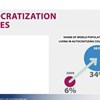elected
Peter Hedström elected to the board of the Swedish Research Council
Peter Hedström was elected to the board of the Swedish Research Council (VR) on the 4th of December for the period of 2012–2015. The researcher Christofer Edling was elected to the Scientific Council
Peter Hedström elected a member of the Royal Swedish Academy of Letters, History and Antiquities
On the 6th of May, Peter Hedström was elected a member of the Royal Swedish Academy of Letters, History and Antiquities. The Royal Swedish Academy of Letters, History and Antiquities was founded in 175
Gustaf Arrhenius elected to a council which will help government with sustainability
During the Swedish politician's week in Visby, the government decided to appoint a scientific council for sustainable development. The council will strengthen the link between politics and academia. Th
Environmentalism around the globe. An introduction to the 2020 ISSP environment module and selected country-level findings
International Journal of Sociology Abstract Environmental problems such as climate change, air and water pollution, and biodiversity loss affect humans globally. The International Social Survey Programm
President of the Swedish Sociological Association
Professor Stefan Svallfors was elected President of the Swedish Sociological Association for the years 2014-2016. Read more about Stefan Svallfors.
"Most MPs are not all that sharp." Political employees and representative democracy
Working Paper 2016 no. 2(Published in International Journal of Public Administration, Vol 40 (7), pp 548-558 (2017) DOI: http://dx.doi.org/10.1080/01900692.2016.1157693) This paper analyses the orient
“Most MPs are Not All that Sharp.” Political Employees and Representative Democracy
International Journal of Public Administration, Vol 40 (7), s 548-558 (2017) DOI: http://dx.doi.org/10.1080/01900692.2016.1157693 Abstract The article analyses the orientations of political employees in

Anna Lührmann: Walking the Talk. Which Parties Threaten Democracy?
The recent increase of democratic declines around the world has sparked a new generation of studies on the topic. Scholars agree that these days the main threat to democracy arises from democratically
Bo Rothstein: A social science dilemma. Is there a contradiction between democracy and quality of government?
Research seminar with Bo Rothstein.AbstractMost definitions of democracy rely on a set of procedural rules for how political power should be accessed legitimately. The basic norm for these procedural ru realized by equal democratic rights. In this understanding of political legitimacy, democracy is a “partisan game” where various interests are given fair possibilities to compete for political power. The concept of “quality of government” relates to the legitimacy in the of political power and is based on the norm of that is the opposite of partisanship. This is to be realized by, for example, the rule of law and a public administration built on meritocracy. Several tensions between these two bases for achieving political legitimacy will be present. For example, a democratically elected government may want to politicize the public administration and may establish public services and benefits directed only to their political supporters. The rule of law includes the principle of equality before the law, but a democratically elected government may take actions that put itself “above” the law. Various empirical measures and philosophical principles for understanding these type of tensions between democracy and the quality of government will be presented in this lecture.

Bo Rothstein: Is there a contradiction between democracy and quality of government?
Most definitions of democracy rely on a set of procedural rules for how political power should be accessed legitimately. The basic norm for these procedural rules is according to noted democracy theor








